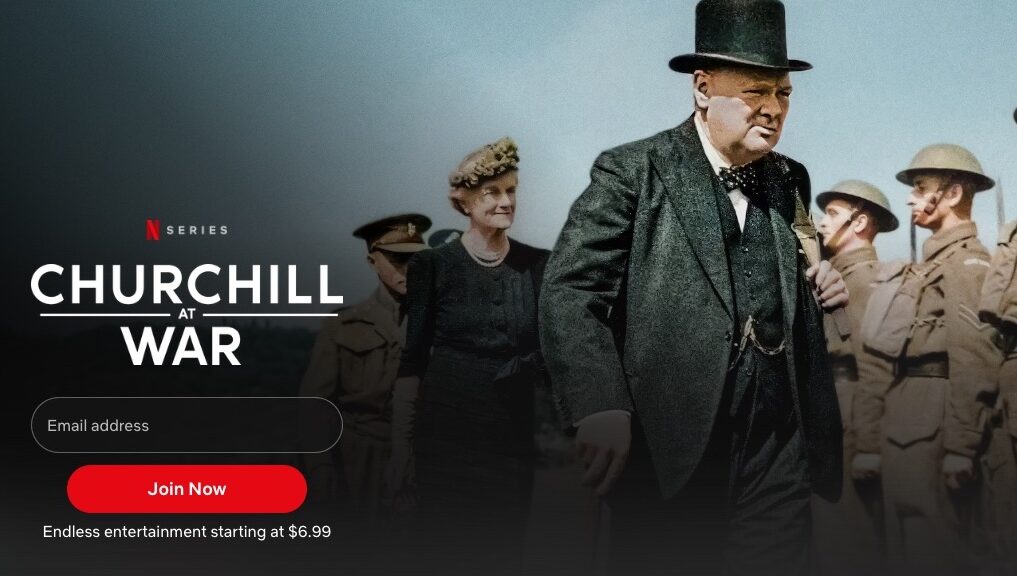
Reviewing Netflix’s Churchill: The Things We Do for England…
This review of the Netflix “Churchill at War” documentary first appeared in The American Spectator on 13 December 2024.
Churchill at War
A four-part Netflix documentary starring Christian McKay as Winston Churchill, premiered December 4th.
From Gaza to Ukraine, United Nations to United Europe, our legacy is the war that made us what we are. Winston Churchill had much to do with it, and Netflix now offers its version of his story. It is a one-dimensional portrait of a politician—not of the humanitarian who thought profoundly about governance, life and liberty. Yet the warrior emerges approximately as he was.
There’s a way to derive a mostly correct picture of the man from this show: ignore Part 1. The other three parts also suffer from occasional forays into fiction. But they are far more accurate, with honest dialogue, well-chosen quotations and spectacular footage, much of it freshly colorized.
A creaky wind-up
Part 1, alas, is a palimpsest of counterfactuals. Were it not for Andrew Roberts, and several other scholars who have actually spent time studying Churchill, this introduction to him is light, frothy and tendentious. It bids fair to mislead the unwary viewer.
Sprinkling in celebrities and the odd hostile biographer doesn’t help. (The more hostile they are, the more they indulge in the familiarity “Winston.”) Among the celebrities is George W. Bush, who says Churchill grew up in a “dysfunctional family.” By Victorian standards it was more functional than the Bushes. Why Bush? Or Boris Johnson? Ask most politicians about Churchill and what you get are generalities: blood, toil, tears and sweat. But Netflix also consults more serious commentators, who commit greater errors….
• Churchill’s father’s career-ending 1886 resignation comes when “his budget was rejected.” No, it was over a minor Army appropriation. Okay, no biggie.
• In South Africa in 1899, young Churchill “takes over defense” of the famous armored train from Boer attackers. Poor Alymer Haldane, who actually defended it, spent half a century lamenting that “Winston got all the credit.” And now Netflix bites Aylmer again.
• We skid past Churchill’s climb to fame and Parliament, informed that he changed parties twice—not over principle, but as an opportunistic power-grab. Not so. After his 1904 switch he waited two years to get power. The second time, in 1924, he was handed power before he switched. Where do people get such stuff? Have they read anything?
Escaped scapegoat
Churchill’s vital efforts to prepare the fleet for war in 1914 are ignored as Netflix homes in on the Dardanelles operation, whose failure temporarily ruined him. Aside from confusing naval operations with the Gallipoli landings, which he had nothing to do with, the account is reasonably accurate. They assert incorrectly that he quit the Admiralty in 1915 in order to go fight in the trenches, but his service there (later) is accurately represented.
We witness his deep depression over Gallipoli, but Christian McKay, impersonating WSC, gets the diction wrong and looks more like his son-in-law Christopher Soames. By straining hard, we can just visualize McKay in the role. But he’s no match for Robert Hardy (The Wilderness Years) or Gary Oldman (Darkest Hour), who spent months studying their character “to find a way in.”
Part 1 ends as Churchill succeeds Neville Chamberlain as Prime Minister in 1940. The accuracy improves as 1940 approaches. Despite earlier errors, this is a fair presentation compared to popular mythology like Brian Cox in Churchill, but hardly rates a cigar, given the banal content.
Jon Meacham, who should know better, says WSC “got lots wrong, but among what he got right, WW2 ranks pretty high.” Duh! That’s as profound as we get, though to his credit, Meacham is more poignant later on. But after laboring through Part 1, I was beginning to think: “The things we do for England.”
A better pitch
The weakness of using celebrities or “historians” who are anything but Churchill specialists is still evident in the last three parts, but less disconcerting. Let’s get over the quibbles first.
• It’s true that the first bombing of London (August 1940) was accidental, prompting British retaliation on Berlin, leading to the London Blitz. But Netflix says Hitler and Churchill “egged each other on,” not acknowledging that bombing open cities had been the German practice since they leveled Warsaw in 1939.
• In July 1940 Churchill “sank the French navy.” (It wasn’t the whole navy.) In August 1941, he pleads with Roosevelt to declare war, and is instructed about the U.S. Constitution. (That never happened—he knew the Constitution as well as FDR.) U.S. entry into the war in December is dramatically portrayed, omitting that Hitler locked-in the “Germany first” strategy when he declared war four days after Pearl Harbor.
• The 1943-44 Bengal Famine is misrepresented by Kehinde Andrews. Churchill caused it—well, he refused to send Canadian grain. (Actually he sent more grain, via Australia.) Andrews claims Churchill saw his “main task” as “defending the Empire.” No, he saw his main task as defeating Hitler, and doing that helped lose the Empire. Mr. Andrews offers several other red herrings. (“I like the martial and commanding air with which the Rt. Hon. Gentleman treats facts,” Churchill once quipped. “He stands no nonsense from them.”)
• Churchill is condemned for the 1944 “spheres of influence” agreement with Stalin. We are not told that he saw this as a wartime expedient, not a permanent arrangement—or that it saved Greece from communism.
Netflix gets lots right…

…about the war. It covers the quandary over bombing Auschwitz; concerns over invading Europe; D-Day (if nothing about how Churchill made D-Day possible). Here the dialogue is accurate, the war footage admirable, the commentary balanced.
They can’t help editing some great speeches, even though deleted words would use up only a second or two. They make up for this by getting many right (unlike the British Post Office on a recent commemorative stamp: “You ask what is our aim? I can answer in one word: victory.”)
Key quotations are deployed effectively, like Churchill’s warning to FDR of where the U.S. will be if Britain goes under. His classic speech at Harrow, clean and unedited, includes its often-ignored proviso: “Never give in—except to convictions of honour and good sense.”
This is all to the good. Every time a faux expert muddies facts, Roberts or another solid historian—Meacham, Allen Packwood, Catherine Gale Katz—makes up for it with truths. Even David Lammy, Britain’s Foreign Minister, is thoughtful and doesn’t succumb to populist virtue-signaling. “The British people,” Lammy says, “saw in Churchill the image of themselves.”
After Part 1 I was expecting the worst, but on balance it’s a good show, and the finale is well done. Kudos to Lord Roberts and others for keeping it on track, and for his eloquent finale:
Physically brave, morally brave, full of insights and foresight, humorous to the point that he can still make people laugh sixty years after his death, Winston Churchill represented a resolute spirit that is very, very rarely seen in human history.
More film reviews
Robert Hardy in The Wilderness Years: Forty Years On and Still Number One, 2019.
”Gary Oldman in Darkest Hour: Then Out Spake Brave Horatius,” 2018.
“Darkest Hour Myth-Making: Don’t Mess with Marcus Peters,” 2018.
“Brian Cox as Churchill: An Interview with Charlie Rose,” 2017.







2 thoughts on “Reviewing Netflix’s Churchill: The Things We Do for England…”
I enjoyed it especially readings from Churchill’s own speeches and writings but gave it a B+ I agree that some of the celebs and speech writers were weak and really distracted from the real story. Liked your ending: “After Part 1 I was expecting the worst, but on balance it’s a good show, and the finale is well done. Kudos to Lord Roberts and others for keeping it on track, and for his eloquent finale: ‘Physically brave, morally brave, full of insights and foresight, humorous to the point that he can still make people laugh sixty years after his death, Winston Churchill represented a resolute spirit that is very, very rarely seen in human history.’”
In July 1940, Churchill “sank the French navy.” What was not mentioned was the degree of resentment amongst the Vichy French after the deaths of French sailors at Mers el Kebir. It manifested in Vichy forces putting up stronger resistance than anticipated in engagements such as the Battle of Casablanca, where in Operation Torch, 1,300 French, 526 Americans, and 574 British were killed. The Americans had anticipated a soft landing from their long-time ally, “France”. Instead, they were met with fierce resistance; why? Churchill was desperate to hold onto the Suez Canal, and the measures taken at Mers el Kebir undermined America’s first engagement in North Africa. This is particularly significant because the American High Command did not want to land in North Africa; they wanted to go straight for a European Invasion landing via the North Sea.
Acquiescing to Churchill’s Suez Canal priorities, the Americans thought the landings at Casablanca would be an easy way to get into the war. Sadly, they found out differently. These and other missteps by the British would lead to the decision that the Supreme Commander of all allied forces would be an American, Eisenhower.
=
There is I think a connection between Mers el Kebir in July 1940 and resistance to the “Torch” landings eighteen months later; but none in the selection of an American supreme commander four years later. Churchill’s 1940 action, which pained him to the bone, was taken for both military and psychological reasons: A major French fleet in German hands was unthinkable. As for the psychological, Churchill wrote: “Here was this Britain which so many had counted down and out, which strangers had supposed to be quivering on the brink of surrender to the mighty power arrayed against her, striking ruthlessly at her dearest friends of yesterday and securing for a while to herself the undisputed command of the sea. It was made plain that the British War Cabinet feared nothing and would stop at nothing.” This was indeed proven by subsequent events. See also the remarkable about-face by General de Gaulle when upbraided for his remarks by Clementine Churchill. There was more to the North Africa decision than the Suez Canal; the Allies were in no way ready to invade Europe, so military reality prevailed. —RML
Comments are closed.